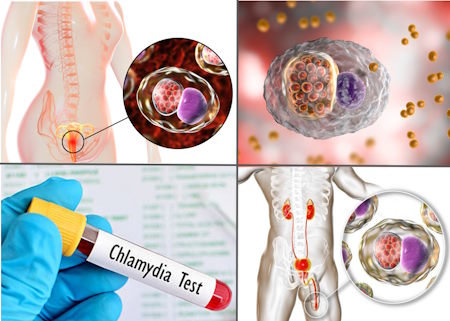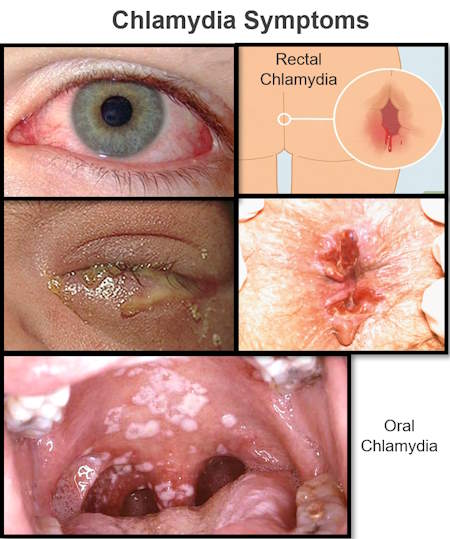Chlamydia: Causes, Symptoms, Treatment & Prevention
What is Chlamydia?
Chlamydia is a sexually transmitted infection (STI) caused by the bacteria *Chlamydia trachomatis*. It’s the most common bacterial STI in the U.S., Europe, and worldwide. You can get chlamydia through vaginal, anal, or oral sex with someone who has it. Pregnant individuals can also pass it to their babies during birth. Most people with chlamydia don’t have symptoms, but if left untreated, it can lead to serious health issues, especially for women. The good news is that chlamydia can be cured with antibiotics.
How Do You Get Chlamydia?
Chlamydia is a bacterial infection that is typically spread through sexual activity or contact with infected genital fluids (semen or vaginal fluid). You can contract chlamydia through unprotected vaginal, anal, or oral sex, as well as by sharing sex toys that have not been washed or covered with a new condom each time they are used. Additionally, chlamydia can be transmitted through genital contact with an infected person, even without penetration, orgasm, or ejaculation. Infected semen or vaginal fluid getting into the eye is another potential route of transmission. Pregnant women with chlamydia can also pass the infection to their babies during childbirth.
It’s important to note that chlamydia cannot be spread through casual contact such as kissing, hugging, or sharing baths, towels, swimming pools, toilet seats, or cutlery.
Who is Affected by Chlamydia?
Anyone, whether male or female, who is sexually active can get chlamydia. The bacteria that cause chlamydia are transmitted through vaginal fluid and semen, making it possible for anyone who engages in sexual activity to become infected and subsequently infect their partners. Additionally, if a pregnant woman has chlamydia, she can pass the infection to her newborn during childbirth.
The risk of contracting chlamydia increases if you have a new sexual partner, multiple sexual partners, or if you have previously had chlamydia and engage in sexual activity with a partner who was not treated for the infection.
Chlamydia Prevalence
In the United States
Chlamydia is the most common bacterial sexually transmitted infection (STI) in the United States, with approximately 1.5 million cases reported annually. However, the actual number of infections is likely higher since many cases are asymptomatic and go unreported. Certain demographic characteristics, such as age, gender, and race, may increase the likelihood of being diagnosed with chlamydia. Those at higher risk include:
- Teenagers and young adults aged 15 to 24: Over half of all diagnosed chlamydia cases in the U.S. occur in this age group, with a higher rate among women.
- Men who have sex with men : Chlamydia disproportionately affects men who have sex with other men, compared to those who have sex with women.
- Non-Hispanic Black populations: Chlamydia infections are more prevalent in non-Hispanic Black communities.
Higher transmission rates among certain groups are more related to social networks and limited access to STI prevention resources rather than sexual behavior alone. Chlamydia is more likely to spread in communities with higher infection rates and among groups lacking access to sex education and preventive measures like condoms and dental dams.
Worldwide
An estimated 128.5 million new cases of Chlamydia trachomatis infection were reported worldwide among adults aged 15 to 49 years in 2020. The global prevalence was estimated at 4.0% for women and 2.5% for men. Chlamydial infections are more common among young people. Lymphogranuloma venereum (LGV), a relatively rare form of chlamydia, has experienced a resurgence in some countries, particularly among gay men and other men who have sex with men. Another strain of chlamydia causes trachoma, which is transmitted through contact with eye and nasal discharge, especially among young children.
Symptoms of Chlamydia
Many individuals with chlamydia experience no symptoms or only mild ones. If symptoms do occur, they may not appear until up to three weeks after having sexual contact with someone who has chlamydia.
Chlamydia Symptoms In Women
- Changes in vaginal discharge
- Bleeding between menstrual periods or after sex
- Pain or discomfort in the lower abdomen
- Burning sensation when urinating
Chlamydia Symptoms In Men
- Burning sensation when urinating
- Discharge from the penis
- Pain or discomfort in the testicles
Chlamydia Symptoms for Throat Infection
Chlamydia can also infect the throat, often without causing symptoms. For people with chlamydia of the throat who do experience symptoms, these may include::-
- Pain in the mouth, throat, or both
- Redness in the mouth or throat
- White spots towards the back of the mouth
- Sores in the mouth or around the lips
- Swollen lymph nodes
- Possible fever
Chlamydia Symptoms for Rectal infections
The LGV (Lymphogranuloma Venereum) type of chlamydia can cause:-
- Severe inflammation, leading to genital ulcers
- Lymph node enlargement, or inflammation of the anorectal area with discharge
- Abdominal cramps, diarrhea and constipation
- Fever
- Pain while passing stools.
Infants born to mothers with chlamydia may develop eye infections or pneumonia, which can be treated with antibiotics for newborns.
Complications of Chlamydia
Untreated chlamydia can pose significant health risks. If you notice any symptoms of chlamydia, make an appointment with your healthcare provider immediately. Regular STI screenings are also crucial to prevent complications.
Complications of chlamydia for women
- Pelvic Inflammatory Disease (PID): A serious condition that may require hospitalization. PID can result from untreated chlamydia and can damage reproductive organs, leading to infertility, chronic pelvic pain, and life-threatening ectopic pregnancies.
- Pregnancy complications: Untreated chlamydia can cause pre-term delivery. Pregnant individuals with chlamydia can pass the infection to their newborns, potentially causing pneumonia or conjunctivitis, which could lead to blindness if untreated. Pregnant individuals should be tested for chlamydia at their first prenatal appointment.
- Infertility: Untreated chlamydia can cause permanent damage to the fallopian tubes, uterus, or vagina, making it difficult to become pregnant.
Complications of chlamydia for men
- Epididymitis: The infection can spread to the testicles and epididymis, causing pain, swelling, and tenderness.
- Reduced fertility: Chlamydia can harm sperm, affecting the ability to conceive.
Complications of chlamydia that can affect everyone
- Reactive arthritis: Untreated chlamydia can spread to the bloodstream, increasing the risk of reactive arthritis, which causes swollen and painful joints.
- Increased risk of HIV: Chlamydia can increase the chances of contracting HIV.
- The LGV (Lymphogranuloma Venereum) type of chlamydia can be invasive and systemic. If not treated early, it can result in chronic oozing lesions around the anorectal region, strictures, reactive joint pain, and swelling. Oral ulceration and lymph node swelling may also occur.
- Social Stigma: Chlamydia infection can also cause stigma and impact personal relationships, though these effects are often difficult to quantify.
Chlamydia Diagnosis
Molecular tests are the gold standard for diagnosing C. trachomatis, either in laboratories or at the point of care. Some rapid diagnostic tests are available but perform poorly compared to molecular tests. Sexual history and risk assessment are crucial before diagnosis, with clinical examination providing important diagnostic clues.
In primary healthcare settings lacking diagnostic capacity for C. trachomatis, a syndromic approach is recommended. Urine samples are commonly used but are less sensitive than swabs from genital, anal, and oropharyngeal sites. Self-collection of samples is recommended as it provides results similar to those collected by healthcare providers.
Regular testing is recommended for individuals at increased risk, such as female sex workers, to prevent complications and spread. Co-testing for other STIs and notifying sexual partners is also advised.
Chlamydia Treatment
Chlamydia can be treated and cleared up with antibiotics, typically within a week or two. The most common antibiotics used to treat chlamydia are:
- Doxycycline: Usually taken over seven days and is the preferred treatment.
- Azithromycin: Typically taken as a single dose and is recommended as the first choice during pregnancy.
Only take antibiotics prescribed by your healthcare provider. It is crucial not to stop taking your medication prematurely, even if your symptoms improve. Follow-up with your healthcare provider is necessary to confirm that the infection is completely gone after finishing your medication, as chlamydia can recur.
An important part of your treatment is to avoid sexual activities that could lead to re-infection and to ensure that any sexual partners who may be infected also receive treatment. Here’s what you should do:
- Abstain from sex until your infection has cleared up: Starting treatment does not mean you are in the clear. Complete your entire course of medication as directed by your provider and avoid all sexual contact during this period.
- Inform sexual partners: Notify any sexual partners from the last three months about your infection so they can get tested and treated if necessary.
- Get tested for other STIs: It is common to have multiple STIs. Make sure to get screened for other infections such as HIV/AIDS, syphilis, herpes, and gonorrhea to receive appropriate treatment.
While antibiotics can eliminate the infection, they cannot reverse any damage the bacteria may have caused before treatment. This underscores the importance of regular chlamydia screenings, seeking medical attention at the first sign of symptoms, and receiving immediate treatment if infected.
Chlamydia Prevention
There is no vaccine available against Chlamydia trachomatis. The most effective way to prevent chlamydial infection, outside of monogamous relationships, is the consistent and correct use of condoms during vaginal and anal sex.
For pregnant individuals, getting tested for chlamydia and receiving prompt treatment if positive is crucial to prevent transmission to the baby.
Avoiding vaginal, anal, or oral sex with someone who has a chlamydia infection is essential. Additionally, ensure that sex toys do not come into contact with your genitals if they carry the bacteria.
It is often difficult to know if a current or potential partner has chlamydia, especially since many people with the infection do not exhibit symptoms. Therefore, incorporating safer sex practices into your regular sex life is advisable:
- Use condoms during intercourse, anal sex, and oral sex.
- Use dental dams during oral sex or vagina-to-vagina contact.
- Avoid sharing sex toys, but if you do, wash them thoroughly after each use and cover them with a condom for penetration.
- Maintain a monogamous relationship, ensuring that your partner only has sex with you.
Outlook and Prognosis
- With proper treatment, chlamydia should resolve within one to two weeks. Regular STI screenings and safer sex practices are essential for long-term sexual health.
- Once chlamydia is treated with antibiotics, the infection typically resolves within one to three weeks. It is recommended to abstain from sex during the seven-day antibiotic course.
- Without proper antibiotic treatment, a person unaware of their chlamydia infection could carry it for years, potentially infecting other sexual partners and experiencing serious complications.
- While antibiotics can cure chlamydia, they won’t address any additional complications that may arise from the infection. Therefore, it is crucial to get tested and treated promptly.
Frequently Asked Questions (FAQs)
Can chlamydia go away on its own?
Chlamydia will not go away on its own. Left untreated, it can cause severe health problems. If you are sexually active, you also risk infecting others, leading to further complications.
How soon after treatment will I feel better?
You should start feeling better within a week after beginning antibiotics. However, continue taking your antibiotics until the entire course is completed, even if your symptoms improve.
How long should I wait to have sex if I am getting treatment for chlamydia?
Avoid all sexual activities, including intercourse, anal, and oral sex, for at least seven days after starting treatment. This allows the medication to work effectively and prevents infecting your sexual partners. After completing treatment, continue practicing safe sex and get regular STI screenings as part of your routine health maintenance.
Can I have chlamydia and a UTI at the same time?
Yes, it’s possible to have chlamydia and a urinary tract infection (UTI) simultaneously. Both conditions can affect the urinary system, but they have different causes. Chlamydia is a sexually transmitted infection, while UTIs are typically caused by bacteria from the digestive tract entering the urinary system.
How can I tell the difference between chlamydia and a yeast infection?
While chlamydia and yeast infections can both cause discomfort in the genital area, they have distinct differences:
- Cause: Chlamydia is a bacterial sexually transmitted infection, while yeast infections are fungal and not sexually transmitted.
- Discharge: Chlamydia often causes a yellowish or cloudy discharge, whereas yeast infections typically produce a thick, white, cottage cheese-like discharge.
- Symptoms: Chlamydia may cause pain during urination and sexual intercourse, while yeast infections often cause itching and burning in the vaginal area.
How soon after unprotected sex can I get tested for chlamydia?
It’s recommended to wait 1-2 weeks after potential exposure before getting tested for chlamydia. Testing too early may result in a false negative.
Can I get chlamydia from oral sex?
Yes, chlamydia can be transmitted through oral sex. It can infect the throat, as well as the genitals and rectum.
Is chlamydia curable?
Yes, chlamydia is curable with the appropriate antibiotic treatment. However, you can get reinfected if exposed again after treatment.
Conclusion
Regular screening, prompt treatment, and safer sex practices are key to managing chlamydia and preventing its spread. Engaging in open conversations with healthcare providers about sexual health is essential for overall well-being. Chlamydia does not always have noticeable symptoms. Honest communication with sexual partners and regular testing are crucial for preventing and managing the infection.










